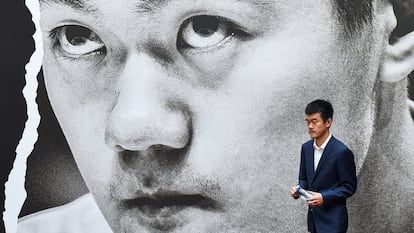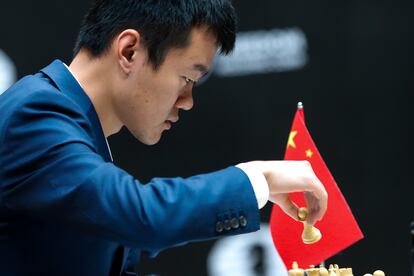Ding Liren, world chess champion: ‘I remembered Camus: ‘If you can’t win, you have to resist’’
The 30-year-old talks about his dramatic win over Russia’s Ian Nepomniachtchi, his love of poetry and why he describes himself as both a ‘very emotional and rational’ person


He likes to watch and listen to the rain. But he’s also just become the world chess champion, triumphing in a sport that involves a lot of mental boxing. Ding Liren, 30, has been playing chess intensively since he was four years old. However, he completed a law degree because his father did not want him to abandon his studies. He also reads a lot, especially philosophy. Ding — who is heir to the throne of Norwegian chess player Magnus Carlsen after defeating Russia’s Ian Nepomniachtchi in an electrifying quick tiebreaker — spoke to EL PAÍS for 20 minutes in Astana, Kazakhstan. What follows includes quotes from previous interviews Ding has done with Chinese media.
Between the celebration, the excitement and speaking with 15 different Chinese media outlets, Ding has not slept “a minute” all night. “I only had time to take a shower,” he says. The immensely humble chess champion, who struggles to express himself in English, feels strange in a place full of cameras, cables and various technical gadgets. But Ding wants to address everyone’s questions to the best of his abilities. “I understand that the press is important.” Shortly before speaking with this newspaper, he broke down in tears during the recording of his official interview with the International Chess Federation (FIDE). Ding became emotional when he began explaining the advice a friend gave him after he lost the second game of the World Chess Championship.

It was at that moment that he remembered the title of a book by American poet Louise Glück: Until the World Reflects the Deepest Needs of the Soul. Ding explained that he adapted this idea to face his professional and emotional challenges, which were marked at the time by his breakup with his girlfriend. “Some of my readings have made me a better player,” he says, citing what happened on Saturday, when he was on the brink of defeat for six and a half hours before bringing the last classic game of the tournament to a draw. “I remembered how Albert Camus talks about the concept of resistance. The idea is that if you see that you cannot win, do everything in your power to resist. And that memory gave me the determination I needed.”
Ding sees a great connection between philosophy and chess, since “both are abstract.” But chess is also a highly competitive sport that demands of players great pragmatism and efficiency. As a result, Ding says he has to sideline the more emotional side of his personality while playing chess. “I am both very emotional and rational. And I’m also an art enthusiast. In my normal life, I like to watch and listen to the rain, and also to play basketball. But when I arrive at a tournament, I have to forget those feelings to be more strict and professional.”
But there are very different ways of assuming that professionalism. Russian chess player Garry Kasparov — who was No.1 from 1985 until his retirement in 2005 — was not satisfied with just winning the game, he wanted to annihilate his adversary. By contrast, the Indian chess player Viswanathan Anand — who is a five-time world champion and a practicing Hindu — never showed the slightest hint of Kasparov’s killer instinct. Ding has his own approach: “I consider myself an academic, a scholar who really likes to study, and I think I have found new ways to approach chess. When I reached 2,500 points on the international list [among the 700 best in the world], and decided to raise my level, I realized that I had to accept the challenge of also being very competitive.”

Ding was born in Wenzhou, China. His mother is a nurse and traveled with him to Astana for the three-week World Chess Championship. His father is an electrical engineer, who insisted Ding keep studying, even though his talent for chess was already apparent from a very young age. But his father did not let up: Ding had to complete a five-year law degree, even though he knew from the start that he didn’t like it at all. “These are things that I prefer not to talk about much.”
Instead, Ding enthusiastically answers the question of how he is going to remain world champion: “I have to build a strong team, with great teachers and powerful computers. In short, I must be more professional.” Just a day earlier, he had said that being world champion wasn’t that important to him, that what was really essential was to be a better and better player. So how then did he find the motivation to win such an extremely tough finale? “The main key has been my analyst, [Romanian chess player, No.12 in the world] Richard Rapport. He has brought all the creativity that I was lacking with my openings [ways to start a game].” If Ding manages to build his dream team, he will not be afraid of anyone: “I am ready for all challenges, including playing against Carlsen if he wants to recover the title, or to defend it against the young stars.”

Ding entered kamikaze mode at two points in the tournament, with opposing results. He lost the seventh game from a very advantageous position when, with very little time on the clock, he staged a risky attack instead of playing cautiously until move 40, when 60 minutes are added to the players’ clocks. “That has an easy explanation. I just wasn’t aware of how pressed for time I was.” On the other hand, Ding won the last of the rapid tiebreakers in very similar circumstances: “It was clear to me that Niepo was the favorite, both in the rapid-play and in blitz chess [where players are given five minutes each for the entire game]. And if that game had been drawn, like the three previous rapid tiebreakers, we would have gone to the blitz. So I played to win.”
In his interview with FIDE, Ding turned to a Woody Allen film when asked if winning the championship was the happiest moment of his life: “[Woody Allen] says that the English phrase ‘I love you’ doesn’t always express that you love someone very much, that there should be a higher expression than that. In my case, happy is not enough, a stronger word is needed. It’s a huge liberation.” So big in fact that it made him consider quitting chess, he says. “Before the World Championship, I told a friend that I would retire if I lost. And also that, since I know myself well, I would cry a lot if I won. I have won, I have cried a lot, I am not going to retire and life is now going in another direction.”
Sign up for our weekly newsletter to get more English-language news coverage from EL PAÍS USA Edition
Tu suscripción se está usando en otro dispositivo
¿Quieres añadir otro usuario a tu suscripción?
Si continúas leyendo en este dispositivo, no se podrá leer en el otro.
FlechaTu suscripción se está usando en otro dispositivo y solo puedes acceder a EL PAÍS desde un dispositivo a la vez.
Si quieres compartir tu cuenta, cambia tu suscripción a la modalidad Premium, así podrás añadir otro usuario. Cada uno accederá con su propia cuenta de email, lo que os permitirá personalizar vuestra experiencia en EL PAÍS.
¿Tienes una suscripción de empresa? Accede aquí para contratar más cuentas.
En el caso de no saber quién está usando tu cuenta, te recomendamos cambiar tu contraseña aquí.
Si decides continuar compartiendo tu cuenta, este mensaje se mostrará en tu dispositivo y en el de la otra persona que está usando tu cuenta de forma indefinida, afectando a tu experiencia de lectura. Puedes consultar aquí los términos y condiciones de la suscripción digital.








































